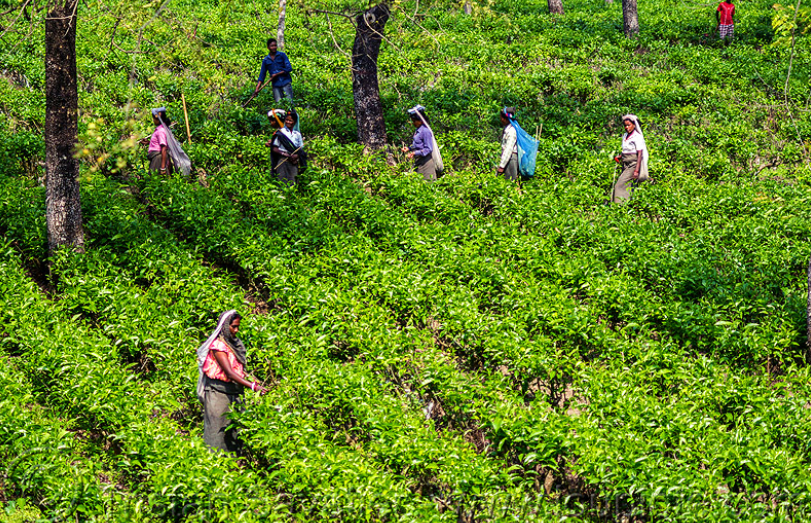Tea Garden Workers Across Party Lines Decide to Fight Together for Minimum Wage in Bengal

Tea workers across political lines recently met at a convention in Darjeeling, North Bengal, and decided to unite and fight to attain minimum wages for the average tea garden workers. They have also sought help from all political parties to help fulfil their long-pending demands.
Called under the aegis of a joint forum, tea workers’ unions belonging to all political platforms, including the ruling Trinamool Congress and Bharatiya Janata Party (BJP), attended the convention. The meeting was presided over by Jiaul Alam, convenor of the joint forum. Participants raised demands over minimum wages, land rights for tea workers, and the upkeep of the tea plantation laws. All the tea garden workers’ unions decided to take forward the fight to attain these rights for the average tea worker in the state.
More than one million people in North Bengal, who are directly or indirectly dependent on the tea-garden economy of the region, have been struggling with their livelihoods. Since the regime change in the state in 2011, the constant refusal of the West Bengal government to comply with the Minimum Wages Act and statutory labour regulations, even in the recent Tripartite Meets, has intensified the workers’ plight.
While the price of everything rises, the tea garden labourers are struggling to make ends meet. Even starvation-related deaths have reportedly occurred due to the withdrawal of assistance to the workers of closed tea gardens. The erstwhile Left Front government started the assistance scheme in the state.
However, hunger and poverty-related deaths of tea garden workers are not new and have been reported for close to a decade. But the situation seems to have reached a tipping point now.
“With a meagre wage of Rs 202, we have to manage everything, which is impossible in these times of inflation,” said Pratap Kujur (55), a tea plantation worker and an activist with the Chiakaman Majdoor Union of Mohor Gulmaa Tea Garden in the Terai region.
The workers are demanding cash components between Rs 239 and Rs 249 from the state’s tea planters to merely sustain themselves. The tea garden workers’ organisations are also demanding wage restructuring through three-year contracts, which so far has gone unheeded even though the unions sought government intervention.
The last wage revision for the staff of the tea gardens took place in February 2015, and the contract expired on March 31, 2017. After this, there has not been any wage contract on behalf of the tea garden owners. In the meantime, there was some wage increment, which was meagre in amount and allegedly took place only on paper.
Read More: Battling Many Woes, Bengal's Tea Garden Workers Seek Wage Revision from Govt
Going by the erstwhile contract, every month, each staff of the tea gardens is losing Rs 6,118, sub-staff Rs 2,422, and each day, tea garden workers are losing Rs 46 on account of ration.
Speaking to Newsclick, Saman Pathak, leader of the CITU-affiliated tea workers' union, had earlier said that there was a nine-rupee ration allowance in the Rs-202 wage of the tea garden workers. But the tea garden owners are allegedly refusing to pay them the allowance.
In the jam-packed convention, the workers' unions decided that the upcoming meeting of the Minimum Wage Advisory Committee, which will be held on October 4 and 5, should decide and enact the minimum wages act. They would not tolerate any more dilly-dallying in this regard, the unions said.
The implementation of minimum wage for the tea garden workers has been due for a long time. On February 20, 2015, the West Bengal government had announced that the minimum wage for tea workers would be announced soon. On December 13, 2018, the Minimum Wage Advisory Committee had placed their observations regarding the minimum wages. However, the minimum wages for the tea garden employees are yet to be enacted.
On last August 31 this year, in the 15th meeting of Minimum Wage Advisory Committee, it was decided that a tripartite committee would be constituted to decide upon the minimum wages. At the meeting, in the presence of state labour minister Becharam Manna and labour commissioner Barun Roy, all the trade unions of tea workers had demanded immediate enactment of the minimum wages. The new six-member committee was constituted with the advisor to the labour minister, additional labour commissioner, two members of the planters’ association, and two from the trade unions.
On September 3, the trade union representatives of the Minimum Wage Advisory Committee sat for a discussion in Siliguri. Later, on September 9, all the trade unions of the tea sector met in Siliguri to decide upon the minimum wages. The main proposals of minimum wages and land rights for the tea garden workers were presented by Jiaul Alam, convenor of the joint forum.
In his address, he said that the backbone of North Bengal’s economy was the tea industry, and more than lakhs of tea workers and employees were dependent on it. In the upcoming October meet of the Advisory Committee, the demands would be reiterated, Alam cautioned and demanded the enactment of minimum wages from October itself. The convention has also demanded a festival bonus of 20% in one instalment by the planters to tea garden workers. They also demanded that the central government pay Rs 1500 crores for the health and nutrition infrastructure of tea garden workers of the state. Suraj Subba and Nakul Subba presented the proposal regarding the same in the convention.
Manikumar Darnel, former Tea Board member, proposed that the 1953 Tea Plantation Act could not be made redundant at any cost. In the convention, the demand to repeal the controversial central farm laws and labour codes was placed by Avijit Majumdar, who also supported the ongoing farmers' agitation in New Delhi.
Get the latest reports & analysis with people's perspective on Protests, movements & deep analytical videos, discussions of the current affairs in your Telegram app. Subscribe to NewsClick's Telegram channel & get Real-Time updates on stories, as they get published on our website.
























